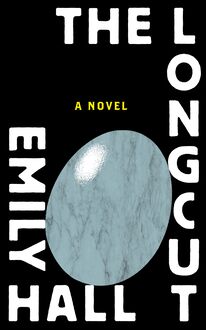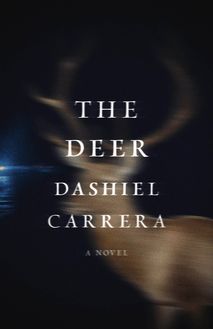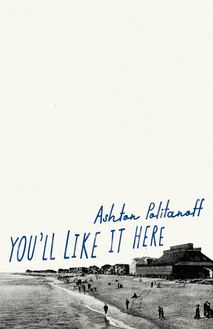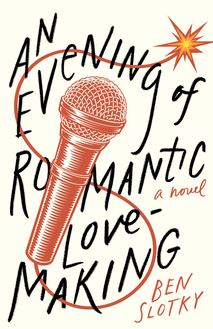-
 Univers
Univers
-
 Ebooks
Ebooks
-
 Livres audio
Livres audio
-
 Presse
Presse
-
 Podcasts
Podcasts
-
 BD
BD
-
 Documents
Documents
-
- Cours
- Révisions
- Ressources pédagogiques
- Sciences de l’éducation
- Manuels scolaires
- Langues
- Travaux de classe
- Annales de BEP
- Etudes supérieures
- Maternelle et primaire
- Fiches de lecture
- Orientation scolaire
- Méthodologie
- Corrigés de devoir
- Annales d’examens et concours
- Annales du bac
- Annales du brevet
- Rapports de stage
La lecture à portée de main
Vous pourrez modifier la taille du texte de cet ouvrage
Découvre YouScribe en t'inscrivant gratuitement
Je m'inscrisDécouvre YouScribe en t'inscrivant gratuitement
Je m'inscrisEn savoir plus
Vous pourrez modifier la taille du texte de cet ouvrage
En savoir plus

Description
- Serial rights targeting New Yorker, Paris Review, Harper’s, n+1, Lit Hub
- Print and digital publicity targeting NPR, The Atlantic, Bookforum, Los Angeles Times, New York Review of Books, London Review of Books, New York Times, Washington Post, The Nation, Lit Hub, Electric Literature
- Multi-city national tour targeting independent bookstores; promotion at festivals
- Review copies sent targeting all major print and digital literary media outlets, reviewers, and booksellers; additional copies available upon request
- Promotion on publisher’s website and social media; promotion via e-newsletters to booksellers, reviewers
The narrator of The Longcut is an artist who doesn’t know what her art is. As she gets lost on her way to a meeting in an art gallery, walking around in circles in a city she knows perfectly well, she finds herself endlessly sidetracked and distracted by the question of what her work is and how she’ll know it when she sees it.
Her mental peregrinations take her through the elements that make up her life: her dull office job where she spends the day moving items into a “completed” column, insomniac nights in her so-called studio (also known as her tiny apartment), encounters with an enigmatic friend who may or may not know her better than she knows herself. But wherever she looks she finds only more questions—what is the difference between the world and the photographed world, why do objects wither in different contexts, what is Cambridge blue—that lead her further away from the one thing that really matters.
An extraordinary feat of syntactical dexterity and comic ingenuity, The Longcut is ultimately a story of resistance to easy answers and the place of art and the artist in the world.
Sujets
Informations
| Publié par | Deep Vellum Publishing |
| Date de parution | 14 novembre 2023 |
| Nombre de lectures | 0 |
| EAN13 | 9781628974164 |
| Langue | English |
Informations légales : prix de location à la page 0,0748€. Cette information est donnée uniquement à titre indicatif conformément à la législation en vigueur.
Extrait
Emily Hall
THE LONGCUT
Copyright © 2021 by Emily Hall
First edition, 2021
All rights reserved
Library of Congress Cataloging-in-Publication Data TK
ISBN: TK
Dalkey Archive Press
Dallas/Dublin
www .dalkeyarchive .com
Ros: We could play at questions.
Guil: What good would that do?
—Tom Stoppard, Rosencrantz & Guildenstern Are Dead
I was always asking myself what my work was, I thought as I walked to the gallery. As an artist I knew I should know what my work was, I thought as I walked, still I did not know what my work was, could not stop asking myself what my work was, it being impossible to think about anything else. It being acceptable as it was for an artist in my time to make art from anything, with anything, about anything, the world constituting the art world in my time being undelimited in a liberating or terrifying manner, still I could not stop asking myself what my work was, even as I told myself I really should already know the answer. Still there was never any question of the question, it remained an open question, the question of what my work was, which is to say how would I know my work when my work presented itself to me.
Walking from street to street in the city to a gallery for a meeting with a gallery person—a gallerist , a word I could not or would not say—I continued asking myself what my work was, how I might discuss my work, whatever it was, at this meeting set up by my friend, the well-known artist who set up situations. This meeting not being, as it was not, a situation that could be said to be part of my friend’s well-known artwork of setting up situations, even as he had in fact set it—the meeting—up, the meeting unrelated to his work being in fact a meeting related somehow, in some manner, to mine.
When I had called her—the gallerist —to arrange the meeting set up by my friend the well-known artist who set up situations, this call taking place the morning post a drinks appointment with him at a rooftop bar, she—the gallerist—had hailed me on the telephone in a hoarse manner, her hailing taking place under hoarse voice conditions. Having delayed and delayed and delayed, I had eventually called this hoarse gallerist, delaying while imagining and rehearsing numerous and various one-sided conversation scenarios, then permitting myself, instead of calling her, to prepare and eat oatmeal while looking out the window at the bodega and laundry across the street, watching someone coming out of the bodega, taking something out of a bag, eating it. The idea of relaying anything to a person with a gallery showing work by people who knew what their work was was too abstract, it abstracted too much information on which my hold was already doubtful, forcing me therefore to cling to the specifics of person eating out of a bag in front of the bodega. We were eating together, that person and I, but I was the only one knowing it. My one-sided eating event with the person across the street being much like my one-sided conversation with the gallery person, or gallerist, I came to the conclusion that I might as well call her.
What I would tell her was a question.
It was a question, both were questions, requiring time for considering, time for considering being always as it was scarce in the category time, allotment of in the life of the artist . The time allotted for the meeting with the gallerist having been achieved by my taking a day off from my job, calling in sick when sick had nothing to do with it, I was thus walking remorsefully to the gallery considering, even as I continued to ask myself what my work was, the likely expression of my boss on my return the next day, my boss having lately been pausing his generally benevolent affect to look at me with a sort of slant through the glass door of his office whenever I passed by. I was not aware of any reason for him to look at me with a sort of slant, whether it had to do with the number of smoking breaks I took during the time allotted or expected for doing the tasks of my job was something he had not relayed to me or had not relayed in any form I recognized. Further, I was trying to keep the number of smoking breaks under control, not being, as I was not, in thrall to smoking so much as to the cognitive processes attached to my doing it, it—the smoking break—being my strategy when I was confronted by a question at my job I did not know the answer to, a strategy of going outside for a smoking break at the end of which, owing to some cerebral or cognitive process, I could answer the question and complete it by moving it into the “completed” column, a resolution thus connected to the cigarette, brought about by the cigarette rather than having been brought about by me. The questions at my job I did not know the answer to were different in every aspect from the question of what my work was, being as they were—the job questions—answerable through the strategy of the smoking break, which the answer to the question of what my work was was not. Whether my boss had noticed or clocked the frequency of my smoking breaks was an open question, even as the security guards at the building where my job took place had noticed and clocked, nodding to me in an I-see-you manner whenever I left the building, although certainly the security guards didn’t in fact care and only told me please to move away from the building’s doorway so as not to turn my smoking break into everyone else’s. My boss had not in fact confronted me about my smoking breaks, still however I needed to keep my job, the realities of the category expenses, pressures of in the life of the artist being brought to bear as they did on me in the usual ways. Without my job, I was always having to remind myself, the escalation of problems in the category expenses, pressures of would leave me little time answer the question of what my work was. I thus had no plans to abandon my job, even with the questions requiring the cognitive processes of smoking to resolve, no matter how alarming the prospect of the crisped condition of my lungs and no matter how often I was made to move away from the building’s entrance by any security guard.
The question of what my work thus was constantly haunting or dogging me, art being as it was something that could be made from anything at all and could be about or relating to anything at all, how therefore, I could not stop asking myself, did you—I—pluck from the stream of life or ideas the contents of your—my—work or the materials with which to do it. I was pulled however hither and yon by the stream of life or ideas, unable to pluck, unable to sort or sift one thing from another, thus the question of what my work was remained an open question, nothing in the other parts of my life having provided a model for or example of how I might close it, the smoking breaks closing the questions I could not answer at my job being not quite the thing. Further I was hampered or dogged by my mental maneuverings, not being able to stop myself, as I was not, following words wherever they went, not being able to stop myself falling into any ferret hole that presented itself, even as I had somehow learned at some point that ferrets preferred not dig their own holes, taking over instead the holes of others, in any case I was forced to follow any idea or reference down any ferret hole it wanted to take over and try out or else to abandon it—the idea or reference—entirely, some other idea having hijacked my cognitive apparatus, and hope to eventually track down laboriously the first idea in whichever ferret hole I had left it and bring it to its logical conclusion. Logical conclusions rarely being of course available, still I tried. My rarely being able to bring any idea to a logical conclusion being more or less a point of fact. It being always of course possible, it continued being possible, that some idea had continued to vectorially travel on its own without me and was no longer in whichever ferret hole I had last seen it, if I could hope even to remember where that was, it being possible that due to mental maneuverings on some other idea, related distantly but distinctly in a manner I would have to laboriously rediscover, the idea would have decided or been forced to travel on a different vector, or else the location of the ferret hole would have moved, shunted off to someplace not previously represented on the map. Still, often I could not remember my first idea anyway, even laboriously tracking back through all various hijackings and ferret holes, my cognitive apparatus yanking me hither and yon, tossing me about as if in a clothes dryer, with the additional problem of the apparatus producing the activity being both the thing doing the tossing and the thing tossed. Of being both the fishhook and the lip. Many ideas sometimes having been lost entirely, they in fact, in odd moments, popped up in new guises that I amnesiatically assumed to be something entirely else. The question of what my work was—to say nothing of the ferret holes—kept me awake at night, whether I made the correct preparations for sleep or threw myself into bed like an undergraduate. A smoking break would do nothing to remedy the situation, in any case a smoking break when I was not at my job was not a smoking break but merely smoking.
My spending the whole of the night picking up and discarding possibilities or working through the possibilities presented by the philosophical objects I was already making but which didn’t answer the question of what my work was left me exhausted at my job on mornings that followed, left me confronted with questions I might ordinarily be able to answer had I not been kept awake all night by the question of what my work was, thus requiring more smoking breaks and thus more slant looks from my boss through the glass door of his office when I returned from my cognitive encounter with the cigarette. My understanding having been previously that he didn’t care how many smoking breaks
-
 Univers
Univers
-
 Ebooks
Ebooks
-
 Livres audio
Livres audio
-
 Presse
Presse
-
 Podcasts
Podcasts
-
 BD
BD
-
 Documents
Documents
-
Jeunesse
-
Littérature
-
Ressources professionnelles
-
Santé et bien-être
-
Savoirs
-
Education
-
Loisirs et hobbies
-
Art, musique et cinéma
-
Actualité et débat de société
-
Jeunesse
-
Littérature
-
Ressources professionnelles
-
Santé et bien-être
-
Savoirs
-
Education
-
Loisirs et hobbies
-
Art, musique et cinéma
-
Actualité et débat de société
-
Actualités
-
Lifestyle
-
Presse jeunesse
-
Presse professionnelle
-
Pratique
-
Presse sportive
-
Presse internationale
-
Culture & Médias
-
Action et Aventures
-
Science-fiction et Fantasy
-
Société
-
Jeunesse
-
Littérature
-
Ressources professionnelles
-
Santé et bien-être
-
Savoirs
-
Education
-
Loisirs et hobbies
-
Art, musique et cinéma
-
Actualité et débat de société
- Cours
- Révisions
- Ressources pédagogiques
- Sciences de l’éducation
- Manuels scolaires
- Langues
- Travaux de classe
- Annales de BEP
- Etudes supérieures
- Maternelle et primaire
- Fiches de lecture
- Orientation scolaire
- Méthodologie
- Corrigés de devoir
- Annales d’examens et concours
- Annales du bac
- Annales du brevet
- Rapports de stage









